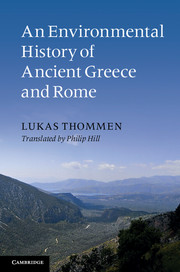Book contents
- Frontmatter
- Contents
- Figures
- Preface
- Introduction
- Part I Greece
- Part II Rome
- Chapter 11 The geographic space
- Chapter 12 People and nature
- Chapter 13 Agriculture
- Chapter 14 Forests and timber
- Chapter 15 Gardens
- Chapter 16 Animals
- Chapter 17 Food
- Chapter 18 Fire and water
- Chapter 19 Earthquakes and volcanoes
- Chapter 20 Mining
- Chapter 21 Urban problems and rural villa construction
- Chapter 22 The environment in Roman Britain
- Conclusion
- Chronology
- Further reading
- Sources
- Bibliography
- Index
Chapter 16 - Animals
Published online by Cambridge University Press: 05 June 2012
- Frontmatter
- Contents
- Figures
- Preface
- Introduction
- Part I Greece
- Part II Rome
- Chapter 11 The geographic space
- Chapter 12 People and nature
- Chapter 13 Agriculture
- Chapter 14 Forests and timber
- Chapter 15 Gardens
- Chapter 16 Animals
- Chapter 17 Food
- Chapter 18 Fire and water
- Chapter 19 Earthquakes and volcanoes
- Chapter 20 Mining
- Chapter 21 Urban problems and rural villa construction
- Chapter 22 The environment in Roman Britain
- Conclusion
- Chronology
- Further reading
- Sources
- Bibliography
- Index
Summary
For the Romans, too, keeping animals was of basic economic and social importance. Under their rule, stockbreeding was intensified and expanded throughout the empire, so that new domestic animals were also introduced north of the Alps, including donkeys, mules, peacocks, pheasants and cats. Moreover, stronger draught cattle and larger horses were bred, and poultry keeping was intensified. At the same time, however, as has been shown especially for pigs, sheep, goats, cattle and geese, suitable local breeds were retained in the conquered areas.
The Romans exploited animals not only for their economic but particularly also for their entertainment value. Animal parks and game enclosures (theriotropheia) had already been known under such Hellenistic rulers as Ptolemy II of Egypt (285–246 bc) in Alexandria (Strab. 3.36.3–4; Athen. 5.201b–c). Since the second century bc, animal enclosures (leporaria, vivaria), aviaries and fish ponds (piscinae) were also maintained on the estates of the Roman upper class. Deer and wild boar, goats and sheep were used both for purposes of show and representation, and for the hunt and food.
- Type
- Chapter
- Information
- An Environmental History of Ancient Greece and Rome , pp. 95 - 97Publisher: Cambridge University PressPrint publication year: 2012



